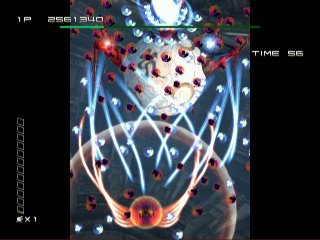This week at the Edinburgh Interactive Entertainment Festival, the UK games magazine Edge and the gave their Edge Award to the DS game Brain Age. The award is intended to recognize innovative games that, according to the awards panel, "celebrated the willingness to aim higher and try something new."
Brain Age was going up against some tough competition, and I am surprised it won. I really don’t think Brain Age is that impressive a game. It’s a mini-games collection wrapped up in a lab coat. My biggest gripe, though, is that it claims to test and improve your mental abilities in ways other games don’t. It certainly makes these tests more obvious and explicit, but a lot of games are mentally challenging and a lot more fun to play.
Consider grown-up games, explore the dubious claims, and meet the competition, all after the jump.
All considered, I’m glad that a DS game won. My months-long love affair with the DS cooled this summer, but we’re still good friends. If you talked to me in April, I would have raved about innovative games like surgery puzzler Trauma Center: Under the Knife and the spazz-tacular dating-themed minigames collection Feel the Magic: XY/XX. I looked forward to series of quirky and fun games on the DS.
Brain Age, and its sillier cousin Big Brain Academy, seem to fit into this quirky category, yet even on first impression the hype surrounding these games made me skeptical. Overall, I applaud Nintendo for aggressively pushing what they call their Touch Generations games. I’m happy to see engaging games that don’t stress fighting and competition, and I think it’s great to see games being marketed to, and appealing to, people outside of the normal gamer demographic. But Brain Age in particular claims to do more than appeal to pacifistic gamers of all ages. It claims to make you smarter. And I claim that is BS on the DS (sorry, couldn’t resist).
We all know as we grow older our bodies change and it becomes important to regularly exercise to maintain health and fitness. Our brain is no different. "Use it or lose it," as the adage goes. New research indicates mental acuity may be strengthened, like muscles, with brain exercises.
That's where Brain Age comes in.
Dr. Elizabeth Zelinski, dean and executive director of University of Southern California’s Leonard Davis School of Gerontology, says games like Brain Age can help keep older generations of Americans’ minds active. “Americans can do a great deal to maintain and even improve their mental abilities,” Zelinski explains. “Aging is about taking on new challenges for our minds. Nintendo’s Brain Age is a great way to do that.”
So says one Brain Age website. I’ll issue a disclaimer here: I don’t know the research that well in this area. I’ve heard many times that staying mentally active helps older people fight age-related declines in cognition. I’m prepared generally to accept Brain Age’s claim. However, I don’t think Brain Age is very special in this regard. I think a lot of games could help people “flex their mental muscles.”
As Nintendo claims in the Brain Age promotional text: “Solving simple math and logic problems quickly, and reading aloud, have been proven to be effective methods of [stimulating your brain].” Fine. But apart from reading aloud, most good games ask players to solve simple math and logic problems. It happens every time they run through a corridor in a Halo 2 team deathmatch, guns blazing, while they quickly count up how many players the see from their team, their opponents’ team, and they calculate a strategy based on those numbers. And fragging doodz is a lot more fun than, say, doing a math problem on a game console.
One day I’ll get around to reading Steven Johnson’s Everything Bad Is Good For You (read a positive review here). I’ve had some personal issues holding me back (including envy), but I think I’ll probably agree with most of his arguments. In his own words (I think) from amazon.com: In general, my argument is that over the past thirty years, the popular culture has grown increasingly demanding in terms of the mental labor you have to do to make sense of it: the number of puzzles you have to solve to complete a video game, the number of separate plots you have to keep track of to follow your average television show, and so on.
Agreed. But Johnson is talking about a game like The Sims, not some specially designed mental gymnasium.
Overall, I think Brain Age rests on a puffed-up gimmick. As games, both Brain Age and Big Brain Academy are just okay. I think they’re good for folks who like minigames, but Nintendo makes some much better minigame collections. They are probably also good if they appeal to people who didn’t think they liked videogames.
But if you accept that the mental exercise is a gimmick, Brain Age is just not that innovative. I personally find it a touch dull as a game. I can’t help but wonder if giving the award to Brain Age was an attempt to stand up for games in a way, to show they are not all about beating up prostitutes or decapitating foes with point-blank shotgun blasts. Brain Age is positively opposed to this image of games. It is clean and nice and already has swirls of media hype around it claiming it makes you smarter. Might the award be an appeal to the non-gaming population (including politicians) to say, see, we value games that are much different than those that support your prejudices?
Why else overlook some of the seriously awesome games that were in the running for the Edge Award? Of the eight nominees, I’ve played six: Brain Age, Dragon Quest VIII, Electroplankton, Indigo Prophecy, Guitar Hero, and Killer 7. Most of these are innovative, but they might not stand out to someone who thinks games are just antisocial boys’ toys. And none of them come pre-packaged with positive press hype about making you healthier.
Five of those six I think are awesome games. I’ll grant that Dragon Quest was not particularly innovative, just very well made. And if you wanted to get technical, we can point to Guitar Freaks and say Guitar Hero, while ginormously sweet, wasn’t exactly trying something new.
Personally, my pick of those I’ve played is Electroplankton. Unprecedented gameplay that many gamers even refused to recognize as gameplay. Perfectly fit to the DS platform with excellent use of the touchscreen. And a simply beautiful graphical style. I wouldn’t call Electroplanton the best game of the last year—I love you SotC!—but for me the game was refreshing and totally original. I’d love to see an Electroplankton sequel (with a save feature!) before I see the third brain training game. Based on the hype, though, I doubt that will happen.
CONTINUE READING...
Collapse post



